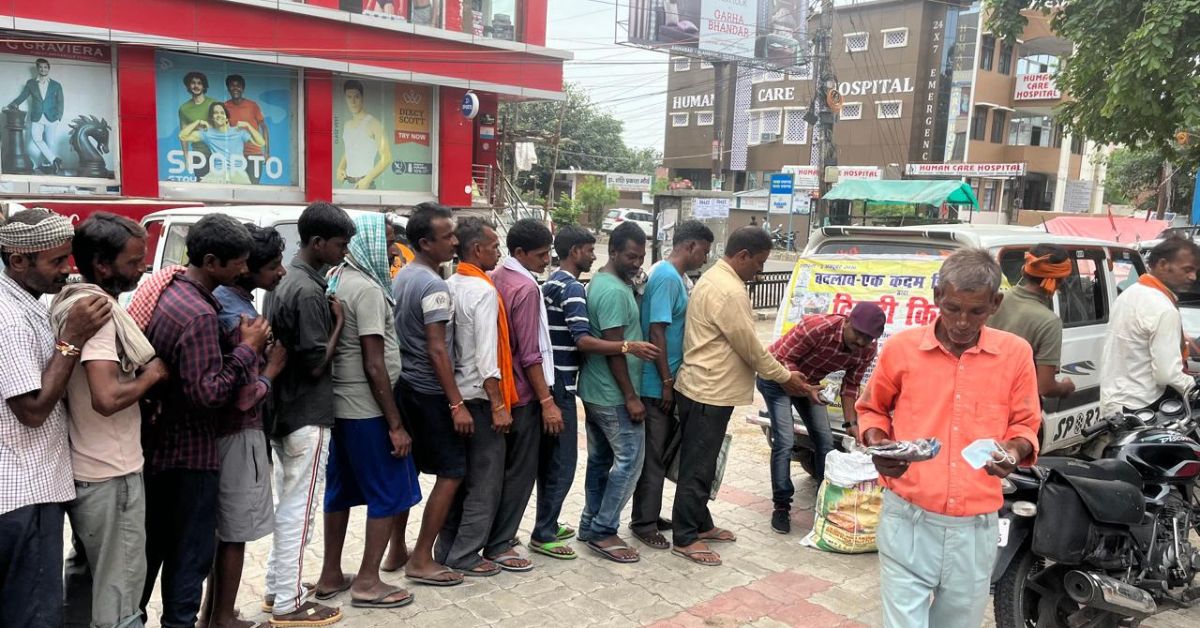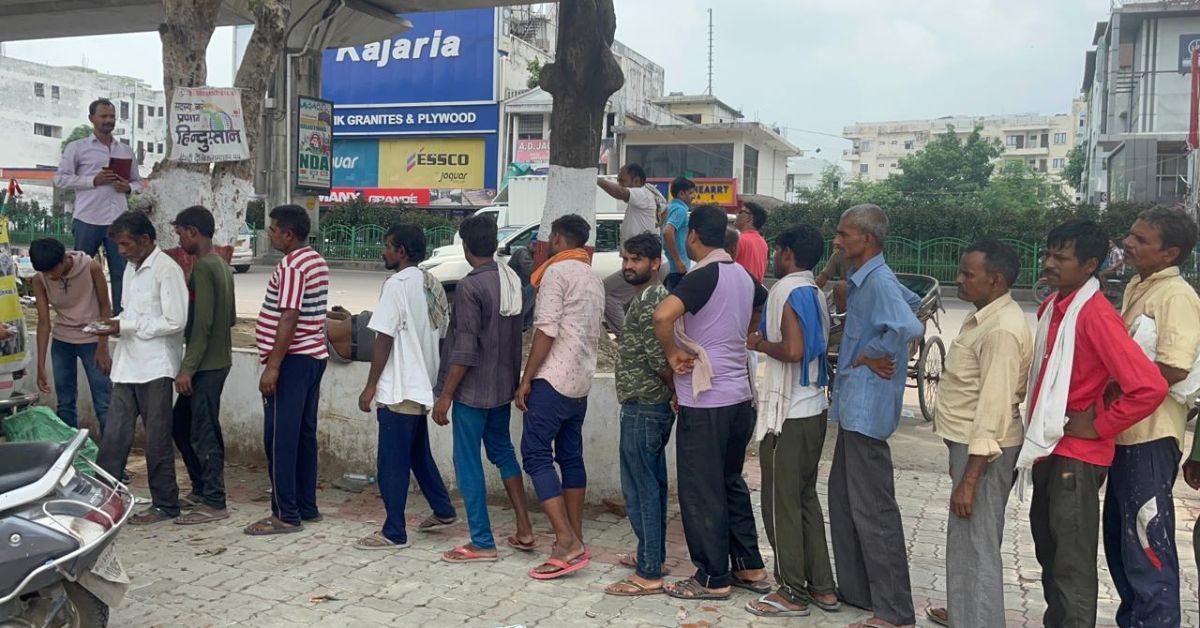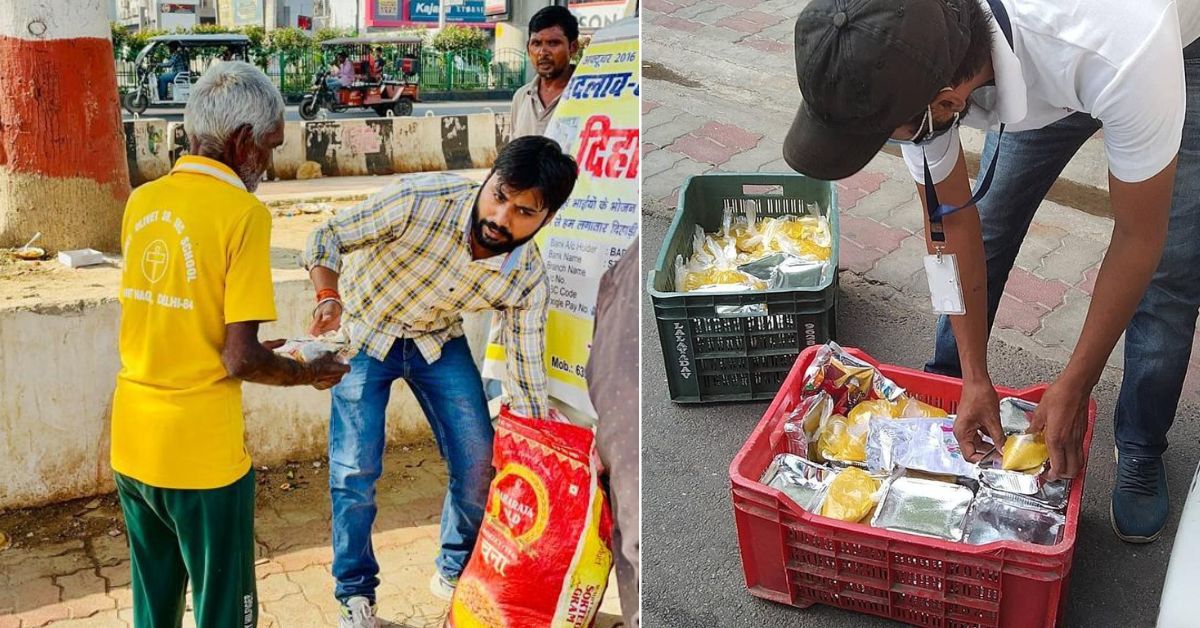Every afternoon, hundreds of daily-wage labourers flock to the bustling Nahariya circle of Lucknow, sparing some time for lunch in an exhausting work day. There, they meet Somnath Kashyap eagerly awaiting to hand over their share of puri sabzi (bread with curry).
During his college days, a 29-year-old Somnath embarked on a transformative journey driven by a simple yet powerful realisation — the distressing sight of food wastage versus the glaring need for it amongst the underprivileged labourers in his city.
“My friend, who was a caterer, often told me about the excess food they had to throw away after weddings and events. One night, he called me to come and collect the leftover food,” he recalls.
“There were many big containers. I took three of my friends and somehow managed to keep those large pots on our scooters and went to distribute the food. It was a little challenging on the first day as we had an overwhelming number of people, but it was so satisfying to see them relish that food,” he adds.
Fueled by a sense of purpose, Somnath, a content writer by profession, started collecting leftover food regularly to distribute among labourers. What began with makeshift arrangements on scooters transformed into a dedicated effort as more caterers joined to support his cause.
By 2017, Somnath had established a more formal setup called ‘Dihadi Kitchen’, involving a small unit with hired cooks. He expanded the operations to serve more than just leftover food but freshly prepared meals focusing on hygiene and cleanliness.

This initiative swiftly grew into a structured offering, turning into a community-supported endeavour that today feeds about 3,000 labourers every week with meals like puri sabji or nutritious lentils with rice.
How to seek help through crowdfunding
Somnath’s mission is supported significantly through social media, which allows him to connect with and inspire a broader audience. The model he adopted demonstrates his belief in the collective power of the community.
Every day, he incurs costs of roughly between Rs 6,000 and Rs 7,500 to prepare meals. This comes to around Rs 15 per day per labourer. He manages these expenses through crowdfunding and direct contributions of supplies like dry rations.
Vishal Gupta, who has been cooking meals for Dihadi Kitchen for the past four years, tells The Better India, “I prepare 400 to 500 food packets almost every day. Each packet contains two to four puris and curry. We cook different kinds of curries depending on the order. It takes us about 14 to 16 kg of flour daily, similarly 8 to 9 kg of potatoes and pumpkin each. Sometimes cooking 5 kg of chola (chickpea) is also sufficient.”
By not directly appealing for financial support but sharing the outcomes and successes through social media, he fosters a more organic and sustainable flow of assistance. He reinforces the belief that everyone has the potential to catalyse significant change.
Based on his experience, Somnath shares five tips for anyone looking to embark on a social cause through crowdfunding:
1. Test yourself
Before setting out on any social work, Somnath suggests testing oneself. He advises against seeking immediate recognition via social media at the early stages, suggesting instead a focus on groundwork and real impact.

“Do not tell anyone about your work for the first six months. It is easier to post your work on day one to get appreciation, but it takes patience and determination to sustain the work for the long term. Work silently first. This would boost your confidence also,” he says.
2. Develop trust within the community
Somnath stresses the importance of building trust and demonstrating consistent commitment over time. “I have seen many social workers who make two to three videos to get attention. But this doesn’t last for long. Only if you have good intent, you can sustain in this field,” he says.
“You can start any social work with just Rs 500, but first, you need to develop the trust of the community. Trust is not built in a day or a month, it takes years. You have to prove to yourself that you are a trustworthy social worker. This will later on attract funders,” he adds.
3. Create online presence
“Creating dedicated pages also helps promote work. Associate yourself with local WhatsApp groups to increase reach and attract more and more funders,” he adds.
4. Ensure transparency
Somnath advises social workers to register their non-profit organisations with state or central governments to ensure transparency and build confidence among funders. “You can also open a dedicated bank account to get the financial support directly and ensure transparency,” he adds.

5. Collaborate with influencers
It took Somnath three years to get financial support from funders. He advises seeking help from influencers and YouTube bloggers by collaborating with them to spread the word about the work, thus attracting financial support from others.
Additionally, Somnath keeps a backup of dry ration for 15 to 20 days to ensure regular meals for labourers. “We have created a list of sponsors who donate to us every month. However, sometimes I need to invest from my pocket when funders fail to keep their promises. But this happens only once or twice a month,” he shares.
Somnath’s story isn’t just a testament to the difference one individual can make but also a call to action for others to step forward and contribute to the journey of social change. This narrative is not just about feeding the hungry but about empowering communities to support each other.
“There was a time when my family didn’t have enough money to afford my school fees and there were people who funded my education. I strive to do the same through community support,” he says.
“I was no one, but today, whatever I am is because of the blessings that I have been getting by feeding these hungry people. These are my true earnings of life,” he remarks.
Somnath aims to support labourers by providing daily meals twice a day. With a donation of just Rs 30, you can feed one labourer for a day.
Account details:
Bank Name: State Bank of India
Bank Address: Alambagh, Lucknow, Uttar Pradesh – 226005
A/C Title: Somnath Kashyap
A/C No: 39877253864
IFSC Code: SBIN0006056
UPI ID: somnathkashyap2223@okaxis
Edited by Pranita Bhat
No comments:
Post a Comment